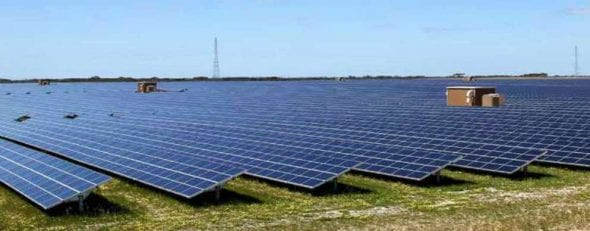
Telstra has signed a contract to build a 70MW solar farm in north Queensland in a bid to cap energy costs, and as the first part of its long-awaited rollout of the Telstra Energy strategy, which may see it compete against major utilities.
The company says it has signed a long-term contract to buy the output of a solar farm near Emerald, which will be built by RES Australia. In doing so, it is following in the footsteps of Sun Metals, the zinc producer building its own 116MW solar farm, and Monash University, which has tendered for a 40MW wind farm or solar farm.
All are investing directly in renewable energy to reduce their electricity costs, which continue to soar in Australia as network costs and wholesale prices rise unchecked.
The deal was unveiled by Ben Burge, who Telstra snapped from Powershop last year to head its new Telstra Energy division. He says it is an important step in Telstra’s strategy to more actively manage its energy consumption and costs, and to reduce emissions.
“We are proud to be taking an active role in Australia’s transition to a lower emissions economy, complementing our long-standing energy efficiency and sustainability programs that saw our emissions intensity per unit of data fall by 56 per cent over three years,” Burge said in a statement.
“The Emerald project is part of Telstra becoming a more active participant in the energy market to reduce costs while at the same time building resilience in our network and contributing to a more stable energy system.”
Construction of the Emerald solar project will begin in the second half of 2017 and electricity generation is expected to commence in 2018.
RES Australia’s chief operating officer Matt Rebbeck said the PPA (power purchase agreement) with Telstra was critical to underwrite the $100 million project, and is the first of the company’s large-scale solar farms to be built.
“It is great to have been able to apply our global experience in long-term power purchase agreements to tailor the deal around Telstra’s requirements and enable new renewable generation to be brought online,” he said in a statement.
“This 160ha new solar plant will be one of the largest renewable energy sources in northern Australia and will create jobs and economic opportunities in regional Queensland.”
Australian companies have been relatively slow to invest directly in large-scale renewable energy projects, but this is expected to change as the cost of wind and solar continue their dramatic falls, and wholesale electricity prices continue to rise.
The purchase price of the Emerald solar farm was not revealed, but large-scale solar is being built in Australia for less than $80/MWh, and less than $70/MWh in Queensland, much less than the average wholesale price in Queensland and other states so far in 2016/17.
Wind power has hit a low of $55/MWh the signing of the contract for the 530MW Stockyard Hill wind farm in Victoria.
In addition, Telstra will keep the large scale renewable energy certificates, which means that if LGCs continue trading at around $80/MWh in 2018 when the project in finished, it will effectively get the electricity from the solar farm for free.
Telstra’s announcement comes as Glencore warns of the potential closure of the Mt Isa mining and smelting operations because of the rising cost of gas power.
But as we report today, Glencore had the opportunity to choose renewable energy over fossil fuels back in 2011, but chose gas because it was thought it provide cost savings over the short term. Perhaps now it should build a solar farm there too.
RES Australia CEO Marco Perona says corporate PPAs are particularly well suited to the Australian energy market. “I would like to commend Telstra for taking the corporate initiative to lead the market. We look forward to delivering this project in partnership with them.”
RES says the Australian market for corporate PPAs is poised for significant growth due to rapidly accelerating electricity and gas prices.
It says it has a significant pipeline of solar projects across key states, alongside a high quality wind farm development portfolio, and energy storage.
Giles Parkinson is founder and editor of One Step Off The Grid, and also edits and founded Renew Economy and The Driven. He has been a journalist for 35 years and is a former business and deputy editor of the Australian Financial Review.


